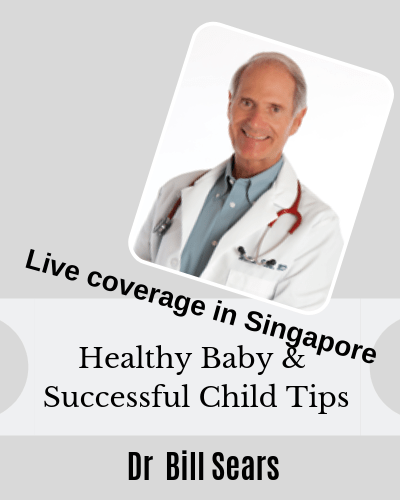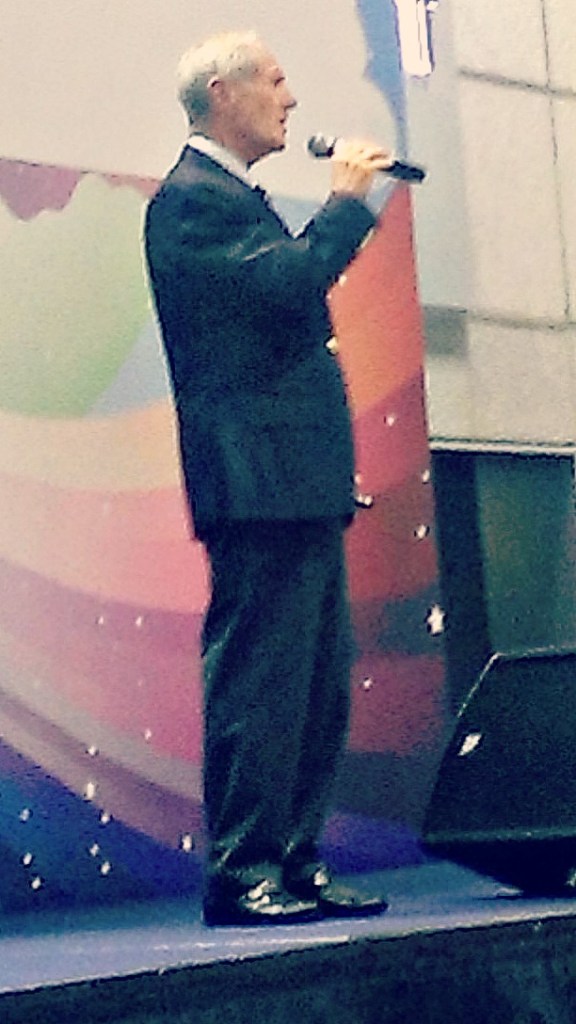Dr. Bill Sears is one of America’s most renowned pediatricians, father of eight children, and author of over 40 books on childcare. He is the Associate Clinical Professor of Pediatrics at the University of California, Irvine, School of Medicine. Dr Sears Lean has a series on this blog that covers many aspects of raising healthy kids. Dr Sears shared many tips in this Singapore workshop ‘Keeping Your Child Healthy’.

- Healthy Child with Dr Sears – Health Q&A
- Healthy Child with Dr Sears – Parenting Q&A
- Attachment Parenting with Dr Sears
- Healthy Child with Dr Sears – Baby Nutrition Q&A
- Healthy Child with Dr Sears – 10 Tools for Success

What to Feed the Smart Baby
Omega 3 (seafood) is recommended as it is important for the brain’s development. Other foods recommended by Dr Sears for brain development are fruits (blueberries), greens and nuts for children over 2-year old. Smoothie can be prepared to include these foods, also salads, spice and appropriate supplements.
Rice cereal is no longer recommended as a first food as it does not contain the essential fats.
Picky Eaters
A child may not be picky, sometimes parents have to remember that children have tiny tummies and a fistful of food is sufficient portion meal size. So, instead of feeding 3 meals a day, ‘grazing’ ie giving foods for the child to nibble throughout the day is increasingly studied to improve their growth and helps with even sugar level. Dr Sears suggested leaving foods in a tray and let the ‘picky’ eater pick at it instead of insisting that they be eaten at one go.
When to Feed Your Baby
On-demand feeding is increasingly recommended versus feeding babies on four-hour schedule, which had been associated with a failure to thrive. Breast milk gets out of baby’s stomach in about 45 minutes, much shorter time than formula milk as casein takes a longer time to digest. Mothers who breastfeed will not need to worry about under or over feeding their babies.
How to Prevent Childhood Illness
Dr Sears recommended breastfeeding, feeding the child with real food (not processed, junk food), immune-boosting foods (see this Dr Sears Lean Series: Raising Healthy Kids by Boosting Immune System) and get the recommended vaccinations.
A word on Childhood Vaccinations
Dr Sears shared that vaccinations are good for the child, family and society. About 2.5 million life are saved per year but sadly, 1.5 million children die each year from vaccine-preventable disease. It is a myth that vaccinations should be put on hold till the child is holder, as the whole point of vaccination is to protect the infant who is the most vulnerable. MMR (measles) vaccine has also been disproven to cause autism through a study involving 500,000 children.
What to do with Colic Baby
Colic is mostly due to Gastroesophageal reflux which should not be ignored because continued severe reflux can damage the lining of the esophagus. Sleeping in inclined upright position, sipping rather than drinking too much at a go, antacid prescriptions can help relieve the reflux.
What to do with Fussy Baby
Again, similar to colic baby that is better termed ‘hurting baby’, fussy baby is better termed ‘high need baby’. These babies have a higher need to be touched, held, more intense, more active, therefore demanding and draining their parents more. As they can be more sensitive to separation, it is best to hold these babies in arms, closer to breast.
I didn’t get to have Dr Sears vet through this post before publishing, any and all mistakes mine. Next week, we will cover more on parenting.





